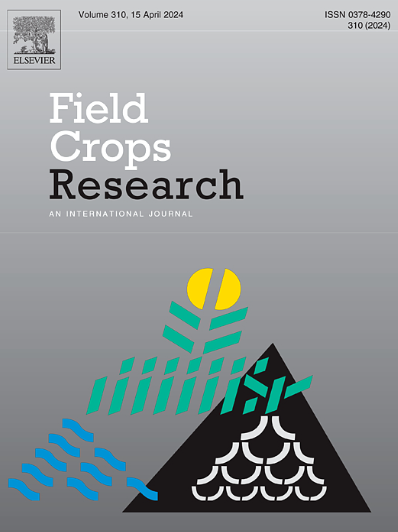Adaptation progress and challenges of winter wheat breeding in China under climate warming
IF 5.6
1区 农林科学
Q1 AGRONOMY
引用次数: 0
Abstract
Context
Plant breeding has successfully adapted crops globally, with one of the emerging challenges being the adaptation to progressively warmer days and nights. While the adaptation of wheat varieties to future climate conditions is crucial, a thorough understanding of this process remains limited.
Objective
Here, we evaluated genetic advancement under current and future climates by using a dataset of real wheat breeding trials using 9669 wheat varieties from 2012 to 2023.
Results and conclusions
The findings revealed the following: Under climate change, yield decreased by mean 1.44 % for advanced wheat breeding strains, compared with that of the check varieties (-2.49 %). Yields of advanced wheat breeding lines decreased by mean 3.16 % per 1 °C warming compared with those of check varieties (-4.52 %), indicating the superior climate resilience of the former. Wheat yield losses due to warming occurred frequently in the later stages of wheat growth (heading-maturity). Under the future climate in four shared socioeconomic pathways (SSPs) (SSP1–2.6, SSP2–4.5, SSP3–7.0, SSP5–8.5), advanced winter wheat breeding varieties had difficulty overcoming the declining yield trend, suggesting that breeding heat-tolerant wheat varieties will continue to be a priority and a challenge in managing under the conditions of climate warming.
Significant
Our study highlights that accelerating the current progress in breeding for heat tolerance in wheat is imperative.
气候变暖下中国冬小麦育种适应进展与挑战
植物育种已经成功地适应了全球作物,其中一个新出现的挑战是适应日益温暖的白天和黑夜。虽然小麦品种对未来气候条件的适应至关重要,但对这一过程的透彻理解仍然有限。目的利用2012年至2023年9669个小麦品种的实际育种试验数据,评估当前和未来气候条件下的遗传进展。结果与结论:在气候变化条件下,小麦高级选育品系的产量比对照品系平均下降1.44 %(-2.49 %);与对照品种(-4.52 %)相比,每升温1°C,高级小麦选品系的产量平均下降3.16 %,表明高级小麦选品系具有较强的气候适应能力。增温造成的小麦产量损失经常发生在小麦生长后期(抽穗期至成熟期)。在4条共享社会经济路径(SSP1-2.6、SSP2-4.5、SSP3-7.0、SSP5-8.5)的未来气候条件下,先进冬小麦育种品种难以克服产量下降的趋势,这表明在气候变暖条件下,培育耐热小麦品种仍将是当务之急,也是面临的挑战。本研究强调,加快小麦耐热性育种的进展是当务之急。
本文章由计算机程序翻译,如有差异,请以英文原文为准。
求助全文
约1分钟内获得全文
求助全文
来源期刊

Field Crops Research
农林科学-农艺学
CiteScore
9.60
自引率
12.10%
发文量
307
审稿时长
46 days
期刊介绍:
Field Crops Research is an international journal publishing scientific articles on:
√ experimental and modelling research at field, farm and landscape levels
on temperate and tropical crops and cropping systems,
with a focus on crop ecology and physiology, agronomy, and plant genetics and breeding.
 求助内容:
求助内容: 应助结果提醒方式:
应助结果提醒方式:


